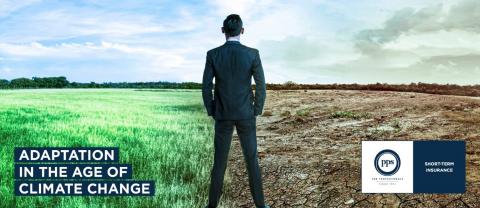Adaptation In The Age Of Climate Change

Following a spate of natural disasters in recent years, South Africans would be hard-pressed to deny the obvious impact that climate change is having on our environment and economy. In the wake of the Knysna fires, Durban floods, and Gauteng hailstorms, among others, it’s clear that there is no place to hide from the effects of a climate in flux. The same goes for insurances companies – especially since they are bearing a large part of the burden in repairing the damage. So, how do insurers respond, and what does that mean for you?
To put these events in perspective, 2017 was the second most expensive year on record for disaster losses and the catalyst that altered the insurance industry’s approach. The figures for 2018-2019 are not out yet, but the effect we are currently faced with is that most companies have changed their attitude when it comes to the amount of risk they are willing to assume, making them more cautious in their overall treatment of customers. This shift in mindset is being felt by the public through raised premiums or a withdrawal of cover altogether.
But, as Daléne Delport – manager at Acuideas – has pointed out, “[t]hese methods will not deal with the risks of global warming or reduce the protection gap. Insurance companies need to manage society’s exposure to climate change risks if they want to reduce the protection gap.”
Insurance companies need to get involved in the struggle against climate change by resisting the urge to be risk-averse at every turn. The key to success lies in being flexible and continuously adjusting to the unique problems we face in the modern age.
One way to view climate change is as a problem, but another way to look at it is as a call to continue innovating. Since the insurance industry is particularly vulnerable to these developments, providers have every motivation to establish themselves as pioneers who are leading the way forward.
This can be done by way of environmental initiatives to increase awareness or efforts to enhance services.
For example, recycling is currently one of the most effective methods for combating climate change. It reduces deforestation, minimises greenhouse gas emissions from landfills, and decreases energy consumption.
PPS Short-Term Insurance is already taking action with a green approach that involves recycling and the integration of our re-usable shopping bag, thereby raising awareness of how ordinary citizens can reduce their carbon footprint on a daily basis.
Beyond these strategies for creating collective engagement, insurers also need to consider how their offerings should be adjusted.
Brokers and policy advisors will need to educate themselves about the natural risks that are prevalent in specific areas of the country so that they can explain to customers why their premiums may be raised as a result. Policies that are tailored to each person – and, more importantly, the region they live in – will become the order of the day, rather than a feature that sets the insurer apart. This will demand even better service if insurers are to keep up with customers’ demands.
Clients will also start expecting detailed advice on the steps they can take to minimise these environmental risks to bring down their premiums. Insurance companies will have to remain well-informed and up to date on ways to provide better offerings that go beyond what will soon become ordinary.
These challenges won’t intimidate us into simply side-stepping risk and passing the expense on to our customers. At PPS Short-Term Insurance, we simply view these fluctuations as an opportunity to think of new ways to deliver more to our clients.
We have already embraced the importance of personalised care that takes your unique circumstances into account through our Private Client Specialists, and we are constantly devising strategies to remain a steadfast leader in our industry.
In the case of managing the effects of climate change over the long term, we can only guess how technology may revolutionise the industry’s ability to mitigate these risks. Through predictive technology, we could one day reach a point where natural disasters are anticipated before they take place so that customers can receive warnings in real time and avoid many of the risks involved. Who knows?
What we do know is that since the group’s inception in 1941, PPS has adapted to the needs of the environment to deliver quality services which match the demands of the day. Climate change certainly poses a risk, but it is one PPS Short-Term Insurance won’t shy away from. Call us now and you could play your part in the struggle against climate change to grow with us every day!
References:
https://www.bizcommunity.com/Article/196/363/183698.html
https://www.insurancechat.co.za/2018-02/mother-nature-versus-the-insurance-industry/
https://mg.co.za/article/2017-06-13-climate-change-evident-in-cape-storm-and-knysna-fires
http://www.gorillabins.ca/blog/how-recycling-can-prevent-climate-change/
https://www.pps.co.za/adaptation-age-climate-change

